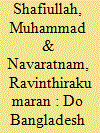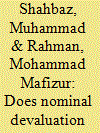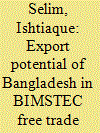|
|
|
Sort Order |
|
|
|
Items / Page
|
|
|
|
|
|
|
| Srl | Item |
| 1 |
ID:
136683


|
|
|
|
|
| Summary/Abstract |
Many see Bangladesh as a land of great possibilities and several promises have been made to tap its potential for the benefit of the country and the betterment of the people. Despite progress, albeit at a slow pace, the country's growth has been and continues to be hampered by problems created by the people at the helm, irrespective of party affiliations. Corruption keeps nibbling at the vitals of the nation, opening wide the “get-rich-overnight” option for all power-mongers. The current scenario of two-party dominance and their tussle for power compounded by social degradation has impeded qualitative changes in the realm and nature of democracy. Exploitation by influential sections has not decreased while dissatisfaction based on poor governance continues to fester. On the positive side however, resilience, at times on the part of the government and always on the part of the masses, has been remarkable.
|
|
|
|
|
|
|
|
|
|
|
|
|
|
|
|
| 2 |
ID:
135829


|
|
|
|
|
| Summary/Abstract |
This paper examines how the poor female borrowers of Grameen Bank microcredit in rural Bangladesh sought to fight social marginalisation through the production of domestic space. Impoverished women used meagre housing loans from Bangladesh's micro-lending bank to replace their climatically vulnerable and poverty-stricken mud huts with ‘modern’ houses made of such durable materials as tin and reinforced concrete columns. But did these enterprising women's pursuit of a strong shelter lead to a higher quality of life and social empowerment? This paper contends that an analysis of a poor entrepreneur's use of microcredit to build a durable house as a pre-condition for social well-being calls into question development economics' conventional emphasis on economic growth as the key indicator of social advancement.
|
|
|
|
|
|
|
|
|
|
|
|
|
|
|
|
| 3 |
ID:
136590


|
|
|
|
|
| Summary/Abstract |
Climate change is a serious and inevitable threat for Bangladesh. The country faces significant challenges to its overall development due to frequent flooding, tropical cyclones, droughts and other natural calamities, all of which deplete a significant amount of the annual national budget. Researches show that climate change has increased the frequency of the natural disasters and is likely to intensify further in the future. It is estimated that, climate change combined with the threat of sea level rise, would cause forced-displacement of millions of people from low-lying and coastal areas of densely populated Bangladesh. The paper reveals that climate change has severe impacts on Bangladesh due to its unique geographical location and socio-economic characteristics. This suggests that climate change poses security threats for Bangladesh in terms of weakening the elements of national power and generating violence in the society. The paper also explored that though Bangladesh is making all out efforts to face climate change, but for obvious reason the role of armed forces has not yet been emphasised at the national strategic level. As such, this paper suggests for the incorporation of Bangladesh armed forces in the national response plans on climate change issues.
|
|
|
|
|
|
|
|
|
|
|
|
|
|
|
|
| 4 |
ID:
136660


|
|
|
|
|
| Summary/Abstract |
With the Bharatiya Janata Party (BJP)-led coalition coming to power in India in May 2014, the issue of illegal immigration from Bangladesh has come to the forefront once again. However, the fear is whether the debate over the issue will shed more light, leading to the resolution of the problem, or whether it will simply degenerate into political rivalry and polarisation. Illegal immigration figured prominently in the run-up to the 2014 parliamentary elections and was often raised by one of the leading political parties, the BJP. No doubt, flagging this important issue was reflected in the improved political fortunes of the party. Meanwhile, some new facts have also emerged that have brought the issue of illegal immigration out from the realm of speculation and given some shape to the problem. These facts indicate that, if anything, the problem has worsened in the last 10 years. There is now a greater need for political parties to work together for a meaningful solution.
|
|
|
|
|
|
|
|
|
|
|
|
|
|
|
|
| 5 |
ID:
143531


|
|
|
|
|
| Summary/Abstract |
The export-led growth (ELG) hypothesis suggests that there is a strong positive linear relationship between a country’s exports and economic growth. For many years, theoretical and empirical studies have examined the causal relationship between exports and economic growth and found that this relationship is one of interdependence rather than of unilateral causation. The purpose of this article is to empirically re-examine the ELG hypothesis in the context of two small South Asian countries: Bangladesh for the period of 1980–2011 and Sri Lanka for the period of 1984–2011. Using a model that controls for a host of domestic and international factors, this article tests the ELG hypothesis by employing the Auto Regressive Distributed Lag (ARDL) bounds test for cointegration and the Granger causality tests. The empirical results confirm the validity of the ELG hypothesis for both Bangladesh and Sri Lanka.
|
|
|
|
|
|
|
|
|
|
|
|
|
|
|
|
| 6 |
ID:
135153


|
|
|
|
|
| Summary/Abstract |
The article aims to investigate the impact of nominal devaluation on income distribution in Bangladesh both in short and long runs. In doing so, Auto Regressive Distributed Lag (ARDL) bounds testing has been employed for cointegration, and Error Correction Model (ECM) has been used for short-run dynamics. The empirical psychology has confirmed the existence of long-run relationship between the variables. Furthermore our estimated results reveal that nominal devaluation tends to decrease income inequality. Though economic growth appears to improve income distribution, non-linear link between both the variables, however, depicts Kuznets’ inverted-U curve (1955). Financial development causes further deterioration in income distribution. Trade openness contributes to income inequality as discussed in Leontief Paradox.
|
|
|
|
|
|
|
|
|
|
|
|
|
|
|
|
| 7 |
ID:
136586


|
|
|
|
|
| Summary/Abstract |
Bangladesh has been striving hard to exploit SAFTA for boosting its TRADEand economic relations with the South Asian neighbours. But this free trade agreement is yet to bring sufficient dividends for Bangladesh. While the role of regional integration in the development process is undeniable, the slow progress of SAFTA in South Asia is a source of frustration for a developing nation like Bangladesh. Accordingly, in an effort to yield trade and economic gains, Bangladesh has become a member of BIMSTEC-FTA. This article uses augmented gravity equation to estimate Bangladesh’s export potentials in BIMSTEC-FTA. It estimates an export equation for Bangladesh taking some relevant variables into account. Also, the model undergoes some diagnostic tests. On the basis of the tests the model is cleared of multicollinearity and heteroscedasticity problems. The results from the estimations show that Bangladesh has export potentials in BIMSTEC-FTA. Therefore, the country’s economy might take advantages from boosting exports to developing economies of BIMSTEC, namely, India and Thailand.
|
|
|
|
|
|
|
|
|
|
|
|
|
|
|
|
| 8 |
ID:
134245


|
|
|
|
|
| Summary/Abstract |
The right to life is inherently connected with the right to food which implies that any foodstuff be nutritious and safe. The government of Bangladesh bears binding obligations to protect these rights under both international human rights instruments and its national constitution. The violation of these rights has, nonetheless, been commonplace causing numerous human deaths and terminal diseases. The perpetrators have been adulterating foods, flouting laws with impunity and taking advantage of regulatory impotence and governmental lenience for decades. Laws exist in books, regulators subsist in theory, but consumers die without remedies. This situation must not prevail forever as every human has an inherent right to live until their natural demise. This article aims to explore the binding obligations of the government to prevent food adulteration and to protect people’s essential rights. It highlights that numerous laws exist almost invisibly in the country, and recommends that their enforcement be reinforced in order to protect the people who are exposed to the overly contaminated food markets in Bangladesh.
|
|
|
|
|
|
|
|
|
|
|
|
|
|
|
|
| 9 |
ID:
135637


|
|
|
|
|
| Summary/Abstract |
It is about five in the evening and the sun has begun to set. The crowd has started to gather. At this hour, the busiest land trade transit point between India and Bangladesh, Petrapole-Benapole, gears up for the joint retreat ceremony. Songs of Bangladeshi poet Kazi Nazrul Islam and India’s Rabindranath Tagore fill the air, creating a patriotic atmosphere. Contingents of about 10 soldiers each from Border Security Force (BSF) and Border Guards Bangladesh (BGB) respectively march up to the gate at zero line and open the door. Many from among the crowd come there just to watch the troops in full regalia, conducting the drill in perfect unison, and finally, lowering the respective national flags. For the sleepy border villages, it is certainly a glamorous event.
|
|
|
|
|
|
|
|
|
|
|
|
|
|
|
|
| 10 |
ID:
135775


|
|
|
|
|
| Summary/Abstract |
Taking the movement for the rights of indigenous people in Bangladesh as an example, this article elucidates how recent attempts to institutionalise the concept of indigenous people at the global level relate to local claims. These attempts are intrinsically interlinked to identity politics targeting the national political arena, and by adopting the conceptual offerings provided by the UN system as well as those from other parts of the world, activists seek to promote more inclusive approaches. Contemporary translocal indigenous activism, however, is prone to contradictions. On the one hand, identity politics rely upon old-established images of indigenous people with essentialist connotations. On the other hand, it can be observed that the activist configuration, thought in ethnic terms, becomes increasingly porous, for a variety of reasons. After providing an overview of the way indigenous activism in Bangladesh has unfolded recently, the conditions under which the boundaries of belonging to the activist movement are stretched or confined will be discussed. The final part deliberates the findings in relation to the ways in which the social order of the movement may change over time.
|
|
|
|
|
|
|
|
|
|
|
|
|
|
|
|
| 11 |
ID:
134955


|
|
|
|
|
| Summary/Abstract |
India and Bangladesh are interrelated in geopolitical relations but their core objectives are different. While geopolitical compulsions introduce the never-ending challenges of proximity to the two parties, including crucial issues of security, migration and resource sharing, Bangladesh is yet to form its own identity in which the perceived image of India figures predominantly, and the attitudes and expectations they develop towards each other shape the pattern of bilateral interactions between the two countries. Solutions to a number of vexed problems remain elusive and irritants in relations out-number gestures of goodwill. While the warmth in relations has frequently fluctuated with the change of regimes, a sustained pattern of uneasiness and mistrust persists. Analysed at three levels of geopolitics, attitudinal effects and functional exchanges, India–Bangladesh relations appear as a reflection of normal big country–small country power relations where policies are formulated on the basis of the primary principle of self-help but are further shaded by the quest for transforming itself into a nation-state by Bangladesh.
|
|
|
|
|
|
|
|
|
|
|
|
|
|
|
|
| 12 |
ID:
135828


|
|
|
|
|
| Summary/Abstract |
In this paper, I take marriage as the point of entry for exploring social alliances amongst an affluent cluster of the Bangladeshi middle class. Using semi-structured interviews, biographies, family histories, intergenerational data, matrimonial biodata, chat histories, group discussions and blogs, I traced marital genealogies from Bangladesh to Britain in order to understand the strength of their transnational network. I argue that homogamy has become instrumental for this class in consolidating its power as new networks are forged through marriage and in which women play a significant role. These alliances result in the conflation of different kinds of capital, generating a convergence of influence and access among individuals that transcends national boundaries, reconfiguring the group as a cosmopolitan class. This provides a novel perspective on how Bangladeshi women of this class exercise power in marital negotiations while navigating normative practices and patriarchal structures.
|
|
|
|
|
|
|
|
|
|
|
|
|
|
|
|
| 13 |
ID:
136588


|
|
|
|
|
| Summary/Abstract |
The recent settlement of long-standing maritime boundary dispute with India and Myanmar ushers a new horizon for economic development for Bangladesh through utilising the sea and its marine resources. The judgment, not to mention, bears huge implications in many dimensions. Both the verdicts have removed all encumbrances to go ahead with oil and gas exploration in the blocks therein. This will enable Bangladesh to establish ‘Blue Economy’, an alternative economic model, utilising all its marine resources. The concept of ‘Blue Economy’, can significantly contribute to the economic development of Bangladesh. There is no doubt that sea-related issues like expansion of international TRADE, use of marine mineral resources for long-term energy security, proper management of marine fish resources and protection of marine environment and bio-diversity would determine Bangladesh’s future development and economic growth. Bangladesh can be benefited only when it can explore and utilise those resources from the sea. Given this backdrop, this paper attempts to discuss maritime dispute and verdict of Bangladesh in a nutshell, analyse the Bay of Bengal as a hub of huge exploration, challenges therein and finally put forward suggestions for exploring enormous opportunities in the newly settled maritime area.
|
|
|
|
|
|
|
|
|
|
|
|
|
|
|
|
| 14 |
ID:
135157


|
|
|
|
|
| Summary/Abstract |
This article attempts an insight into the power of the powerless people which they employ for their survival where their lifeways have been threatened by the dominant cultures. Based on several ethnographic studies, it shows that the powerless people who do not take arms against the dominant cultures employ cultural resistance. In light of this view, the article focuses on the ethnographic work of the author, where the Toungsa Pahari, powerless indigenous people, employ several strategies for their survival. Juxtaposed with reluctant disposition, they employ cultural resistance in order to survive in the hard environment of the Chittagong Hill Tracts in Bangladesh, endangered by the outsiders (Bangali settlers).
|
|
|
|
|
|
|
|
|
|
|
|
|
|
|
|
| 15 |
ID:
135466


|
|
|
|
|
| Summary/Abstract |
Incident 1 - On the 7th of May, 2013, two members of the Assam Gana Parishad snatched a copy of the 119th Amendment Bill to the Constitution of India from the hands of Salman Khurshid, the then External affairs Minister, Government of India, as he tried to introduce it in the Rajya Sabha. The Bill related to the formalization of the land Swap agreement signed between India and Bangladesh during the Indian Prime Minister’s visit to Bangladesh in September 2011.
|
|
|
|
|
|
|
|
|
|
|
|
|
|
|
|
| 16 |
ID:
135543


|
|
|
|
|
| Summary/Abstract |
The article explores the role of visual media and photography in humanitarian crises. Topics covered include the significance of visual journalism and documentary photography in raising social consciousness, the number of people who were killed in the collapse of the Rana Plaza building in Dhaka, Bangladesh, and the launch of the Bangladesh Worker Safety Initiative to improve safety in the ready-made-garment (RMG) sector.
|
|
|
|
|
|
|
|
|
|
|
|
|
|
|
|
|
|
|
|
|